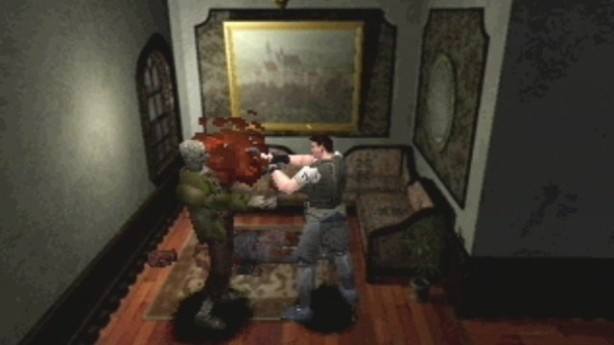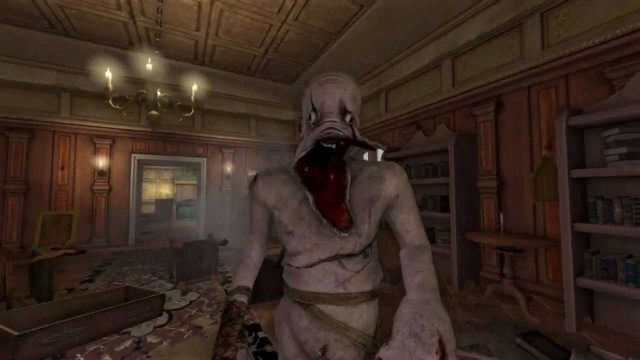Over the years we have seen the genre of survival horror change greatly in various ways. It all started with the grandaddy of them all, Alone in the Dark but it wasn’t until Resident Evil that the genre really began to shine. These changes are so great in fact that, some franchises have become but shadows of their former selves, the original two named above in particular. The question that such changes leave one wondering is, due to change, do survival horror titles scare just as well as in the old titles?

(Alone in the Dark, 1992)
To Jump Scare or not?
It would seem there is a divide in the design of survival horror games these days where they are becoming either all out jump scare syndrome or joining on the Amnesia The Dark Descent bandwagon. Jump scares are simply not scary, they are startling and nothing more than that. Therefore that style of game is not really horror and gets thrown out the window.
From that the Amnesia bandwagon looks like the way to go when it comes to horror these days but are they truly scary? Let’s look at the classic itself, Amnesia The Dark Descent. Despite the fact that it was Frictional Games first title Penumbra that gave birth to this form of survival horror gameplay, it wasn’t until Amnesia that it turned into the cash cow that everybody wanted to also have a piece of the pie.
Amnesia was a great game in its own right and oozed with a classic and done-right atmosphere. It truly had its great moments that were really intense and quite horrifying. The one prime moment that stands out for me is in the flooded cellar with the invisible monster in the water, where you had to jump from crate to crate avoiding it below.
What followed was one of the most intense moments in video game history where you’re pursued down corridors and having to close doors behind you to escape the monstrous being. These two moments were easily the greatest moments in the entire game, but where does that leave the rest of it? The rest of the game felt rather boring after experiencing that and I never truly felt like I was in any danger afterwards. I often saw creatures in the distance but never really face to face. Even when I did, I didn’t have enough time to get a good look at them for them to have any form of scare while running from them. I could have had a big wide-eyed cuddly puppy dog chasing me and it would have had the same effect as long as it killed me.

(Invisible Creature in Amnesia: The Dark Descent)
So is Amnesia really that scary of a game? Not really, it has its moment but I wouldn’t call it extremely scary nor as scary as the hype would make it out.
What about Outlast?
Let’s look at Outlast next. Outlast was without a doubt a damn scary game at times, but it was scary for a different reason to that of Amnesia. I often refer to Outlast as a completely relentless beast, as essentially that is exactly what it is. It simply does not stop from the very first moment you’re pursued, giving you very little breathing time before something is once again attempting to crush your skull in.

(One of many threats in Outlast)
Hiding from enemies was not easy either as they would often search the areas that were possible to hide in such as lockers, under beds and so on and so forth, meaning there was always the possibility that you would be found. It genuinely scared me, my heart was racing, my body temperature increasing and wondering should I continue to play or give it a break. That relentless feeling mixed in with amazing lighting and atmosphere worked brilliantly but this is the only case of a survival horror game that has scared me in recent years and yet it still felt like something was missing. It still didn’t scare me like that of the old games like Resident Evil and Silent Hill.
What is that thing that is missing you might be thinking. In order to answer that question we need to look back into the game that made the genre the greatness that it once was. Let’s go back to 1996 and take a look at the original Resident Evil on the Playstation 1, the game that brought the genre into a being of its own.

(The First Zombie Encounter in Resident Evil)
What did Resident Evil do right?
Resident Evil pitted you against an array of horrors in a very much claustrophobic mansion, with long tight corridors and this ever impending feeling of doom and dread. The ambient music that ran in the background as you journeyed through the mansion just added to this already eerie and mysterious building along with the dimly lit rooms, traps and ambushes.
Ammunition was scarce, wasting it would lead to certain death, awkward tank controls made it extremely hard to control compared to today’s control standards and the fixed camera angles worked perfectly. Due to the camera angles you never really knew what was behind that corner you were walking towards if anything at all. It all left this amazing everlasting psychologically effect on the player’s mind. Silent Hill did exactly the same thing but added in the likes of limited visibility with darkness and fog mixed with extremely strange monsters that made your skin crawl to enhance the psychological effect even further.

(The Darkness Adds to an Already Overwhelming Sense of Dread)
You see it is that psychological effect that is missing from modern-day survival horror, where the game developers create them in a way to play tricks on the player’s mind to the point that their mind creates the horror within itself.
Modern day survival horror even the greats like Amnesia and Outlast are predictable, you know from the design of a room or even from how long it has been since your last encounter when something is going to happen. You know full well it’s about time.
The modern survival horror games are so highly scripted and linear that it’s like following an instruction manual and you quickly begin to see this A,B,C style of design coming into play. While back in the 90s developers were much more limited in what they could do and had to use what they had available and create more of a psychological effecting experience in order for their games to scare.
I have often heard people saying “If a survival horror game has guns in it, it isn’t scary”.
The thing is, having access to a gun in a place full of monsters with little to no places to hide and having little ammunition at your disposal serves a psychological impact on the player immediately in its own right. The player begins to question “do I kill this monster and risk being lower on ammunition than I already am, or do I find a way around it and save ammunition for later when I find myself backed into a corner?”
It is the psychological aspect of horror that is missing from today’s survival horror games. Those moments where the player questions themselves, their actions, their perception and their minds. It is within a persons own mind where the greatest of horror truly lives and this is why survival horror games were scary back in the 90s, as they had such an effect on the player as oppose to today’s survival horror games.
I dream of the day that survival horror games go back to having such effects on the player as it is only then that the genre will reach its greatness once again like it was so many years ago. I feel that if survival horror was going to go back to its true roots with developers understanding what it is that actually made them scary back in the day, that with modern-day technology we could have some of the scariest experiences ever created in any form of media.
That brings me back to the original question of this entire article. Does survival horror scare like it used to? The answer to that question is simply no.







Published: Oct 5, 2015 06:08 am